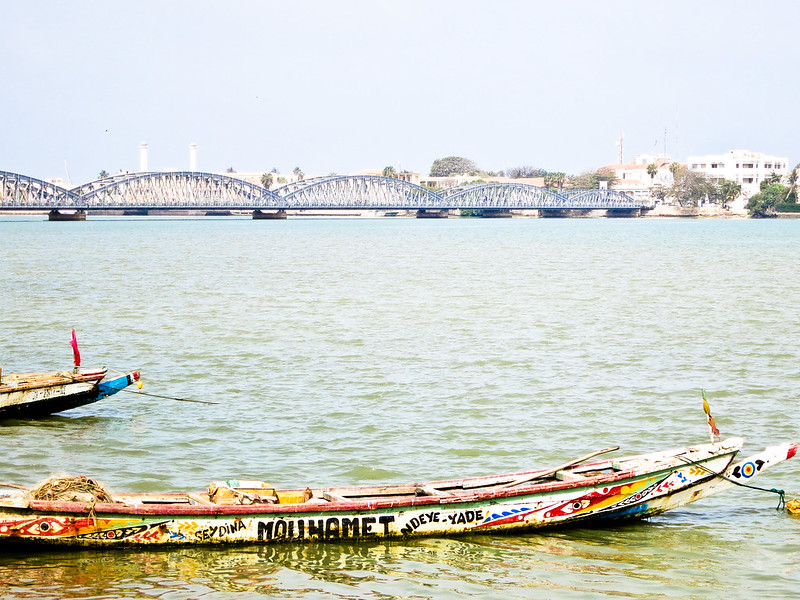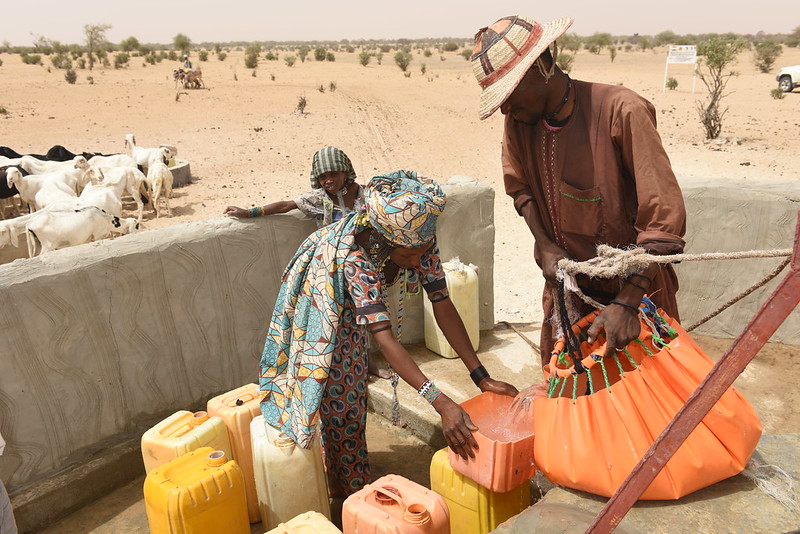Reflecting on 20 years of transboundary water engagement in Western Africa: impacts and lessons learned
Posted in : Blog on 1 March 2022

The Senegal River by Saint-Louis City near the border with Mauritania. Photo credit: Kalyan Neelamraju
Over the last 20 years, the World Bank has invested US$714 million in 10 regional projects in the four major transboundary river basins in West Africa—Senegal, Niger, Lake Chad, and Volta. Share on X The Cooperation in International Waters in Africa (CIWA) program, a multi-donor trust fund that supports Sub-Saharan African countries to unlock the potential for sustainable, climate-resilient growth by addressing constraints to cooperative water resources management, has been an important partner of the World Bank in West Africa, supporting over US$13.7 million of projects in the Niger, Volta, and Chad basins. Today, the World Bank has two ongoing projects in the Senegal and Niger basins, with the former closing at the end of this year, and yet the need for cooperation in transboundary waters has never been as urgent.
Transboundary basins support the livelihoods of most West Africans, and wetlands such as lakes and floodplains, which are shared by neighboring countries, provide invaluable ecosystem services such as food provision and reduction of flood impacts and pollution. But pressures on these transboundary waters are mounting rapidly in the region – from population growth, climate change, poorly managed development, and weak governance, putting at risk all the benefits these waters provide.
The World Bank has a unique opportunity to raise its game and adjust to evolving priorities. The first step in this process was an evaluation of the World Bank’s two-decades-long engagement in the region: What have we learned from our long experience? What has been our impact, our main successes, and our challenges? A Working Paper, World Bank Engagement in Transboundary Waters in West Africa: Retrospective and Lessons Learned, reflects on the Bank’s history in the region to suggest new directions for water resources management and development.
World Bank engagement in water resources management in West Africa has consisted primarily of regional projects. Share on X An initial wave of regional grants from the Global Environment Facility (GEF) and CIWA enabled the World Bank to engage with the four largest West African basins with established River Basin Organizations (RBOs) and with the most potential benefits from riparian cooperation over shared water resources. In the Senegal and Niger basins, these grants led to long-term regional lending programs. In the Lake Chad and Volta basins, grant implementation was more challenging for structural reasons that impeded cooperation, resource mobilization issues, and project design flaws. As a result, and despite progress made on institutional strengthening, no lending programs followed the initial grant in these two basins. However, today, with CIWA’s support, the World Bank remains engaged with the Lake Chad Basin Commission because the lake is a fragility hotspot and a high priority for World Bank management. CIWA’s Lake Chad Transboundary Cooperation initiative aims to develop an analytical and institutional foundation for water security and design activities to support future investments in the region. Share on X
The lending programs for the Senegal and Niger basins have had many notable impacts:
In the Senegal Basin, 20 years of World Bank engagement with the Senegal River Basin Organisation (in French, the Organisation Pour la Mise en Valeur du Fleuve Sénégal (OMVS) facilitated the successful integration into OMVS of Guinea, home to the river’s headwaters; significantly improved information-sharing, and developed, adopted, and implemented a Basin Master Plan and cost-sharing formula . The cost-sharing formula makes OMVS one of the few RBOs in the world (and the only one in Africa) to fully co-own river infrastructure. Investments significantly benefitted the basin’s population, for example, through increases in rural incomes and food security, thanks to the rehabilitation of 20,000 hectares of irrigated land, management of invasive species, and reductions in the prevalence of malaria and schistosomiasis, which increased rapidly since the 1980s, as a consequence of the construction of the Manantali and Diama dams.
In the Niger Basin, the World Bank’s 15-year engagement with the Niger Basin Authority (NBA) has contributed to the sustainable and shared management of basin resources, including critical decisions on infrastructure. The World Bank support proved essential in preventing irreversible decisions about the Fomi Dam, by abandoning the initial site that would have resulted in tremendous negative environmental and social impacts and offset the expected economic benefits. It also addressed risks from the construction of the Kandadji Dam that would have negatively affected the basin’s population. Finally, World Bank engagement helped develop, adopt, and implement a shared vision process, water charter, and a US$3.11 billion climate resilience investment plan that was presented at COP21 in Paris, and with which the NBA has already successfully leveraged significant investments. CIWA has been an important partner in the World Bank’s engagement with the Nile Basin Authority, financing both recipient- and Bank-executed technical assistance. Share on X

A family filling up water containers in Western Africa. Photo credit: Lake Chad Basin Commission (LCBC)
Nonetheless, these programs faced considerable challenges. First, a volatile implementation environment and uneven institutional capacity often slowed implementation of country-level interventions, sometimes even bringing them to a halt. Second, client partners tended to give less attention to nonstructural measures such as training and capacity- building that help ensure the sustainability of structural investments, especially after World Bank financing closed. Third, more could have been done to promote deep and lasting changes that would help these organizations carry out their mandate, such as by implementing effective and sustainable financing mechanisms.
Overall, the World Bank’s engagement in transboundary waters still has limitations in several areas. The World Bank’s regional and national engagements were conducted mostly independently, despite the need for coordination and mutual reinforcement. There has also been limited attention given to transboundary aquifers despite their potential for climate resilience. Though improving today, over the past two decades, other high-priority areas were not given enough attention, namely gender and social inclusion; fragility, conflict, and violence; and nature-based approaches, which also require a strong cross-sectoral approach.
“As this report points out, the need for West African countries to collaborate over shared water resources has never been as urgent. And with climate change causing more frequent, long-term drought events and the region’s high volatility resulting in more forced migrations, it is critical that these countries work together to set a path for long-term water security and resilience.”
– Yogita Mumssen, Practice Manager, West Africa
The World Bank’s historic engagement in transboundary waters in West Africa is at a turning point. Through a combination of projects, technical cooperation, and convening services that build on lessons from the past 20 years, the World Bank and its partners are uniquely placed to support efforts to improve the management of transboundary water resources and tip the balance from conflict to cooperation. CIWA is funding several key analytical works in West Africa to address these issues, including Improving Water Resources Management in Western and Central Sahel, which aims to boost water resources management Share on X by identifying pragmatic investments and policy actions and addressing critical knowledge and capacity gaps. Its Sahel Groundwater Initiative is strengthening groundwater knowledge and management capacity and improving regional cooperation in Ghana, Burkina Faso, Niger, Nigeria, and Côte d’Ivoire. The Strengthening Regional Water Security for Greater Resilience in the G5 Sahel Working Paper builds on this note and proposes a framework for the way forward for World Bank engagement in transboundary waters in West Africa; a forthcoming blog post will delve into the new framework.
Learn more
Elevating groundwater knowledge, exploration capacity, and resources development in the Sahel region of West Africa
A comprehensive understanding of water resources helps manage and preserve Lake Chad
Enhancing Niger Basin’s ecosystem through modeling and improved decision makinghttps://www.ciwaprogram.org/annualreportFY18/niger/ CIWA’S ENGAGEMENTS IN WEST AFRICA
Promoting collaboration for harnessing Lake Chad’s potential
BUILDING CLIMATE RESILIENCE


